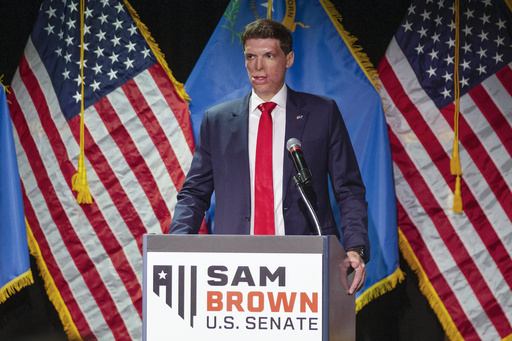LAS VEGAS — In a state known for fiercely contested elections, the U.S. Senate race in Nevada has turned out to be rather uneventful this year.
The contest features Democratic Senator Jacky Rosen, a former computer programmer and leader in her local synagogue, against Republican candidate Sam Brown, a retired Army captain whose appearance is marked by injuries sustained during his service in Afghanistan.
While both political parties recognize that Nevada is experiencing a competitive match at the top of the ticket—between Vice President Kamala Harris and former President Donald Trump—the Senate race has not garnered significant attention, with most indications favoring Rosen.
Rosen, in her first term, has outspent Brown more than three to one, presenting herself as a pragmatic senator focused on delivering results for her constituents, such as enhancing broadband access and establishing a high-speed rail service to Southern California.
Brown, who received the Purple Heart for his military service, has highlighted his life story and addressed the cost-of-living challenges faced by working-class families in Nevada.
However, despite a late influx of financial support from GOP sources anticipating strong voter turnout, he has struggled to gain meaningful momentum in the campaign.
Political analyst David Damore from the University of Nevada, Las Vegas, commented that Brown has not effectively communicated why voters should replace Rosen, who has established herself as the quintessential Nevada senator.
Damore noted that historically, only five incumbent senators in Nevada’s history have lost reelection bids, pointing to a trend of moderate, nonpartisan senators being favored by voters.
Rosen entered the Senate in 2018 following the decline of Republican Senator Dean Heller, who shifted politically to the right amid pressure from Trump.
The other senator representing Nevada, Democratic Catherine Cortez Masto, narrowly secured her seat in 2022 using a similar center-focused approach against a candidate supported by Trump.
Brown, who has had previous political aspirations dating back to 2014 in Texas and attempted to run against Cortez Masto, turned his focus to Nevada, representing both a challenge and an opportunity.
Having been severely injured in 2008 by an improvised explosive device while serving in Afghanistan, Brown’s recovery involved multiple surgeries over many years.
He later founded a business to assist veterans with medical care, and he has made his recovery scars a prominent feature of his campaign. “As a U.S. Senator I will proudly stand alongside Donald Trump to make America affordable, safe, and strong again,” Brown proclaimed at the recent Republican National Convention.
Rosen has actively criticized Brown’s position on abortion, asserting that he would support a national ban if elected.
In Nevada, abortion rights up to 24 weeks are protected under a law from 1990, and there is a measure on the ballot this year aiming to further secure these rights in the state constitution.
Brown identifies as “pro-life” and denies having filled out a previous questionnaire that suggested he would not support exceptions in cases of rape, incest, or health complications for the mother. In a joint interview, he and his wife detailed a personal experience related to abortion that occurred prior to their marriage.
Rosen kicked off her reelection campaign this year with a pledge to prioritize Nevada’s interests over party loyalty.
Every seat is crucial for Republicans, who need to gain two additional Senate seats to achieve a majority.
The GOP feels confident in its prospects in West Virginia, Montana, and Ohio, states that have shown strong Republican support, which has led to lesser investments in Nevada.
The Senate race is not the only area of concern for the Republican Party in Nevada. Although the state holds three Democratic-led House districts that could attract competition, Republicans find themselves at a disadvantage.
Damore criticized the state GOP for poor candidate recruitment and how pro-Trump activists now dominate the party.
In Nevada’s 1st Congressional District, Democratic Representative Dina Titus faces a challenge from retired Army Colonel Mark Robertson, who narrowly lost to her in 2022.
In the 3rd Congressional District, Democratic Representative Susie Lee is working to defend her position against conservative analyst Drew Johnson, which has emerged as one of the most competitive races in the state.
Finally, Democratic Representative Steven Horsford, who chairs the Congressional Black Caucus, aims to retain his seat in the 4th Congressional District, which includes diverse urban areas and deep-red rural regions, where he is opposed by former North Las Vegas Mayor John Lee, a Republican who recently switched party affiliations.



